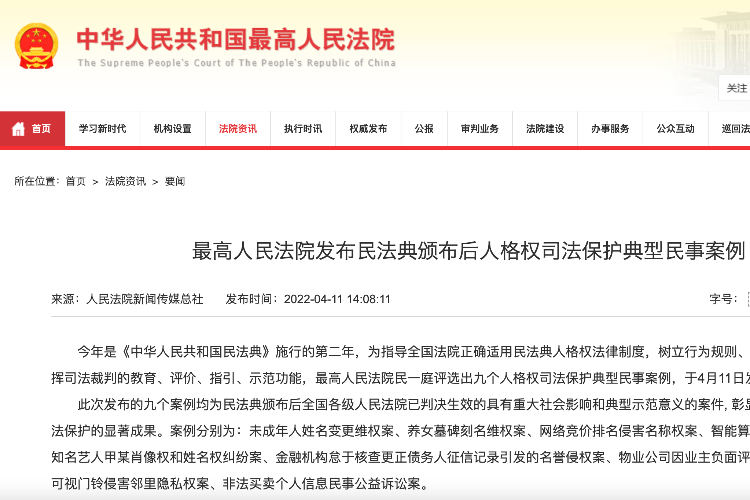Source: Southern Metropolis Daily
Author: Hu Gengshuo, Southern Metropolis Daily
Intern: Yang Xixia

On April 11, the Supreme People's Court (hereinafter referred to as the "Supreme Court") released nine typical civil cases of judicial protection of personality rights. It is worth noting that all nine cases were adjudicated and became effective after the promulgation of the Civil Code. In the case of "Infringement of Personality Rights by Intelligent Algorithm Software," the court determined that the unauthorized use of a natural person's image by artificial intelligence software to create virtual characters constitutes infringement.
According to the case disclosed by the Supreme Court, the defendant is the operator of a certain intelligent mobile phone accounting software, where users can create or add "AI companions" on their own, set their names, avatars, relationship with the user, mutual appellations, etc., and interact with the system through the "training" function.
The plaintiff, Mr. He, is a public figure. Without his consent, the defendant, through algorithmic applications, made the "AI companion" created based on the plaintiff's name and image available to many users, allowing users to upload a large number of the plaintiff's emojis and create interactive content, thereby realizing the "training" function of this "AI companion."
The plaintiff believes that this constitutes an infringement of his general personality rights, image rights, and name rights, and therefore filed a lawsuit with the court, demanding a public apology and compensation for economic losses, mental distress, etc. The defendant argued that the publication of emojis and images related to the plaintiff was the personal behavior of the users, and the defendant did not have subjective fault of knowing or should have known.
The Southern Metropolis Daily reporter found in the Civil Code that Article 1119 stipulates that no organization or individual shall infringe on the image rights of others by vilifying, defaming, or using information technology to forge. Without the consent of the person whose image is used, the image of that person shall not be made, used, or publicly disclosed, except as otherwise provided by law.
The Beijing Internet Court, which accepted this case, ruled after trial that users using the plaintiff's name and image to create virtual characters and produce interactive materials projected the overall image of the plaintiff, including the plaintiff's name, image, and personality traits, onto the AI character. The defendant's behavior falls under the use of the overall personality image containing the plaintiff's image and name.
At the same time, users can establish identity relationships with this AI character, set any mutual appellations, and "train" the character through material production, thereby creating an experience of real interaction with the plaintiff. The defendant's above-mentioned functional settings also involve the personal freedom and dignity of natural persons.
Ma Ce, founding partner of Zhejiang Kending Law Firm, further explained that if users engage in illegal or irregular behavior in creating virtual characters, they should bear legal responsibility as the primary party. However, as the developer and designer of the "AI companion," the operator should conduct appropriate compliance assessments for such virtual reality products before they are launched, and should adjust the product design for functions that are maliciously exploited upon receiving reports and complaints.
In this case, the Beijing Internet Court ruled that although the specific graphics and text were uploaded by users, the defendant's product design and application of algorithms actually encouraged and organized user uploads, directly determining the realization of the core functions of the software. The defendant is no longer just a neutral technical service provider but should bear liability as a content service provider for the infringement.
Therefore, the defendant and the users jointly infringed the plaintiff's image rights. In addition, the defendant's use of the plaintiff's name and image without consent, and the setting of system functions related to the plaintiff's personal freedom and dignity, constitute an infringement of the plaintiff's name rights, image rights, and general personality rights. According to the judgment documents on the Beijing Court's trial information website, the court ruled that the defendant publicly apologize to the plaintiff and compensate him with over 200,000 yuan.
The Supreme Court believes that with the further innovation of the internet industry model in the post-epidemic era and the continuous development of new technologies such as virtual reality, the application of natural person personality elements in virtualized form is increasing. This case clarifies the personality rights of natural persons in relation to their virtual images, and also explores beneficial evaluation standards for the application of algorithms, which is of great significance for strengthening the protection of personality rights in the era of artificial intelligence.
免责声明:本文章仅代表作者个人观点,不代表本平台的立场和观点。本文章仅供信息分享,不构成对任何人的任何投资建议。用户与作者之间的任何争议,与本平台无关。如网页中刊载的文章或图片涉及侵权,请提供相关的权利证明和身份证明发送邮件到support@aicoin.com,本平台相关工作人员将会进行核查。




